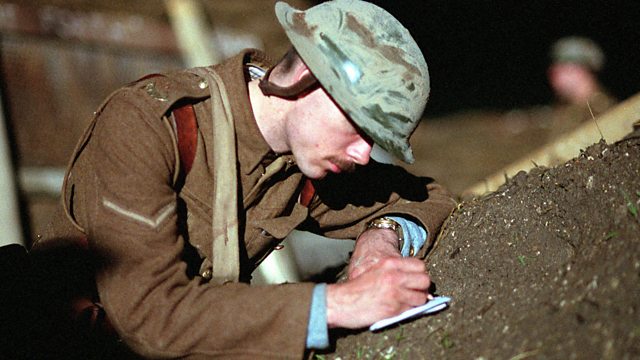
Voices from World War One
Mark Stephen narrates a dramatized history of the First World War, featuring five very different accounts of the war years drawn from diaries and memoirs.
There are no surviving veterans from World War One. What remains are the diaries - first-hand accounts of a bloody and relentless war. Through these words we can begin to understand what people felt at the time, charting how opinions changed as the war progressed. This dramatized feature, narrated by Mark Stephen, takes us through five very different accounts of the war years.
August 5, 1914
'I drifted into a picture house. As I took my seat, it seemed as if some great misfortune had befallen me; and the longer I remained, the more did this strange feeling appear to be shared by all around me.'
When war broke out, Glaswegian Thomas Macmillan and his brother tossed a coin. The winner went to war - to the trenches of Gallipoli:
'...high in the sky vultures circled, waiting for an opportunity to descend. In this atmosphere we existed for seven days in torrid heat, amidst smells that almost destroyed the sense of smell.'
It seemed like a thrill for motorbiking-rebel 18 year old Mairi Chisholm to run away to Flanders to be an ambulance driver, but then she found herself clearing up what was left of boys no older than her, watching them die when she could do no more and fleeing for her life across Belgium:
'When one goes into the room, one is horrified at the suffering - nothing but moans of pain - it's ghastly. I could not believe that I have stood these sights'.
William Begbie was a 15 year old from Leith who joined the Royal Scots territorials just before the war on a nod and a wink from a sympathetic officer. 'It'll do him no harm' said his dad - 'Territorials don't go to war'. How wrong he was. The very next year his son was fighting in the trenches:
'Sometimes a doctor or nurse would ask my age and I had to say 18 or I would have been sent home. I would have liked to go home but not that way'.
Gordon Highlander, George Ramage, provides practical information on how to make a cup of tea in the trenches. A canny observer of modern warfare, he describes it as a scientific war of gas attacks, machine guns and inoculations in which you could spend months in the trenches without seeing a German or firing a shot.
'Killed in action is a wrong description. Many are killed sleeping quietly in the trenches, calmly cooking their food with thoughts far away from war. They are struck down by invisible, unheralded, sudden, silent bullets'.
Arthur Woodburn was a conscientious objector whose hearing to abstain from conflict failed. He was sent to the army and ordered into uniform:
'My turn came to put on the army boots. They produced what appeared to me size 12's. I was ordered to put on the boots. "I'm sorry" I said, "I must refuse". Witnesses had been duly posted to view the crime so that the evidence would be sound. I was marched back to the guard room.'
11 November, 1918 - Thomas Macmillan
'As I approached a busy centre, I observed that the works gates had been thrown open and that commandeered industrial motors, full to capacity with cheering workers were making fast for the centre of the town. My fellow passengers were overcome with excitement, and would insist on speaking to me and expressing their delight at our deliverance... I could do no more than acknowledge with a nod'.
Last on
Broadcasts
- Mon 25 Aug 2014 15:05大象传媒 Radio Scotland
- Fri 2 Jan 2015 12:04大象传媒 Radio Scotland
